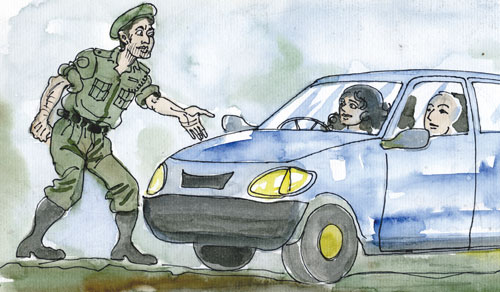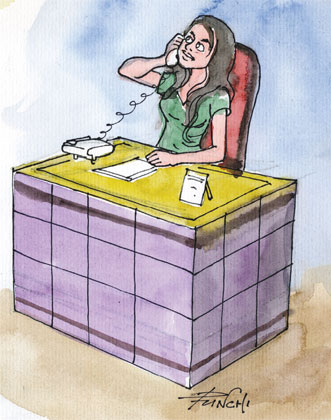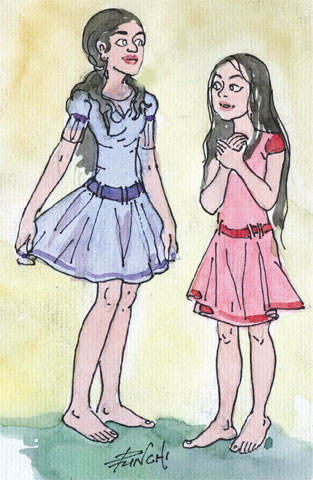|

by R. S. Karunaratne
How to use noun + noun
We can use two nouns together to talk about a kind of thing or
person. The first noun is usually singular.
She likes milk chocolate.
I’m going to the flower shop tomorrow.
 |
|
A man in army uniform
stopped my car. |
Emelda is a hotel receptionist.
Rex is a newspaper editor.
He drank a cup of chocolate milk.
The corner shop sells T-shirts.
Vinod is an English teacher.
What can we buy at the village shop?
What is your telephone number?
This is my office address.
Varuni is an opera singer.
Do you know his e-mail address?
The man who followed me was in police uniform.
She sat on the garden chair.
He wants to know my home address.
A man in army uniform stopped my car.
Write your business address here.
The old man was seated in the corner chair.
The thief jumped over the garden wall and ran away.
Johnson is a jazz singer.
You can buy ice cream at the milk shop.
I like to work at a perfume factory.
They built a high prison wall.
We use noun + noun to talk about what things are made of.
Do you like to have some chicken soup?
She put the coins into a metal box.
Grandmother is fond of chocolate cake.
The prisoner used a plastic fork.
Grandfather drank a bowl of vegetable soup.
The rider was wearing a leather jacket.
I always wear cotton shirts.
People use paper plates at certain functions.
The hotel always serves tomato salad.
There is a stone wall around his mansion.
We use the noun + noun structure when the second noun is made from a
verb + er.
 |
|
Emelda is a hotel receptionist. |
The lorry driver was found guilty of negligent driving.
She uses a hair dryer after a bath.
The Personnel Manager has many responsibilities.
He bought a coffee maker from a duty free shop.
She is an animal lover.
He is a floor cleaner at a big factory.
My father is a tennis player.
want to buy a letter opener.
We hardly see cigar smokers today.
Hilary was a mountain climber.
Sometimes, two nouns make a single word.
Grandmother is an armchair traveller.
The thief snatched a woman’s handbag.
We should keep the bathroom clean.
Schoolchildren use raincoats on rainy days.
The old man is confined to his bedroom.
The postman delivers letters and parcels.
How often do you go to a bookshop?
Sam is a successful businessman.
The tourist carried a heavy suitcase.
You should not use a toothbrush for a long time.
We brush our teeth with toothpaste.
Match words and meanings
Here’s an exciting way to enrich your vocabulary. Match the words in
Column ‘A’ with their meanings in Column ‘B’ and check your answers with
the key. The first has been done for you.
[Column A]
M 1. diffuse
..... 2. dig
..... 3. digger
..... 4. digit
..... 5. dignified
..... 6. dignitary
..... 7. dignity
..... 8. digress
..... 9. diktat
....10. dilapidated
....11. dilate
....12. dilemma
....13. diligent
....14. dillydally
....15. dilute
....16. dim
....17. dimension
....18. diminish
....19. diminutive
....20. dimple
....21. dimwit
....22. din
....23. diner
....24. dinghy
....25. dingy
[Column B]
A. to break up and move soil
B. any one of the ten numbers 0 - 9
C. to move away from the main subject
D. a situation in which a difficult choice has to be made
E. the height, length or width
F. very small
G. a small hollow place on a person’s face
H. not giving or having much light
I. to waste time by being slow
J. to become wider
K. an order which must be obeyed
L. deserving respect
M. to spread in many directions
N. calm, serious and controlled behaviour
O. in poor condition
P. careful and using a lot of effort
Q. to make a liquid weaker by mixing in something else
R. a loud unpleasant confused noise
S. a small open boat
T. dark and dirty
U. someone eating a meal in a restaurant
V. a stupid person
W. to reduce in size or importance
X. someone who has an important position in a society
Y. a machine used for digging
Key:
2. A 3. Y 4. B 5. L 6. X 7. N 8. C 9. K 10. O 11. J 12. D 13. P 14. I
15. Q 16. H 17. E 18. W 19. F 20. G 21. V 22. R 23. U 24. S 25. T
Starters:
Degrees of comparison
We use adjectives to describe nouns. When we use adjectives to
compare two people or things, we use different forms. We form the
comparative of short adjectives by adding ‘er.’
You are taller than me.
 |
|
Punya is prettier than Janaki. |
Train travel is cheaper than bus travel.
Your television set is smaller than mine.
Swarna is a nicer girl than Janani.
John is fatter than William.
We add ‘er’ to two-syllable adjectives to make the comparative form.
Bank employees are happier than labourers.
Shop assistants are busier in the morning than in the evening.
Your clothes are dirtier than mine.
Some people are funnier than others.
This box is heavier than the other.
Her face is lovelier than yours.
We are luckier than some of the other contestants.
Punya is prettier than Janaki.
Your room is tidier than mine.
This road is narrower than the other.
Your son is cleverer than my daughter.
Some adjectives take ‘more’ to form the comparative.
You should have been more careful when crossing the street.
The receptionist was more helpful than the security guard.
The pen is more useful than the pencil.
The film is more exciting than the novel.
This dress is more elegant than what you are wearing.
This novel is more interesting than the other.
Irregular forms
Sam is a good tennis player.
Varuna is a better tennis player than Sam.
Lionel is a bad driver.
Peter is a worse driver than Lionel.
The post office is far from here.
The bank is farther than the post office.
How far do we have to go?
How much further are we going?
Old / older / elder
Use ‘elder’ for members of your own family.
We should respect old people.
I am older than you.
He is my elder brother.
Comparing quantities
We use ‘more’ and its opposite ‘less’ to compare quantities.
You've got more books than I have.
Or: You've got more books than me.
Jane spends less on clothes than Eva.
[Activity]
Complete the following sentences with the comparative of the
adjectives and check your answers with the key.
1. A car is ............. (expensive) a three wheeler.
2. Literature is ................ (interesting) than history.
3. The situation is getting ............. (difficult) after the
nominations.
4. You're ................. (lucky) the other contestants.
5. I was ........... (happy) in my former job.
6. I can't hear what you say. Could you speak a bit ..............
(loud).
7. If you paste these wallpapers, your room will look ............
(elegant).
8. If you get this job, you will be .............. (happy).
9. Wash your hair with shampoo for a .............. (lovely) look.
10. The giraffe is ................ (tall) a man.
Key:
1. more expensive than 2. more interesting 3. more difficult 4.
luckier than 5. happier 6. louder 7. more elegant 8. happier 9. lovelier
10. taller than
Quiz on idioms
An idiom is a special kind of phrase. It is a group of words which
have a different meaning when used together from the one it would have
if the meaning of each word were taken individually. Tick the meaning of
the following idioms and check your answers with the key.
1. He was a dab hand at solving difficult problems.
(a) very good at doing it
(b) very inefficient at doing it
(c) shows average skills at doing it
2. Raj was as daft as a brush. He couldn't answer any of my
questions.
(a) humorous
(b) intelligent
(c) very silly or stupid
3. The two major political parties seem to be at daggers drawn.
(a) they have a common agenda
(b) they have serious disagreements
(c) they have a lot of similarities
4. He stopped the car and looked daggers at the pedestrian crossing
the road.
(a) stared at him angrily
(b) smiled with him
(c) scolded him
5. If someone is pushing up the daisies ...
(a) they are dead
(b) they are living
(c) they are very happy
6. The wet weather has put a damper on the day's activities.
(a) disrupted
(b) encouraged everybody to participate
(c) stopped it being successful
7. If someone leads you a merry dance ...
(a) they encourage you to achieve your object
(b) they obstruct your attempt to achieve something
(c) they ignore you
8. If you are in the dark about something ...
(a) you know nothing about it
(b) you know everything about it
(c) you know very little about it
9. If you keep something dark ...
(a) you divulge a secret
(b) you keep it a secret
(c) you have an open mind
10. If you take a leap in the dark ...
(a) you do something without knowing its consequences
(b) you do something knowing its consequences
(c) you stop doing something
Key:
1. (a) 2. (c) 3. (b) 4. (a) 5. (a) 6. (c) 7. (b) 8. (a) 9. (b) 10.
(a) |

